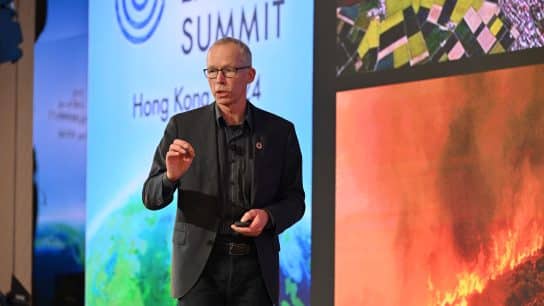In today’s anthropogenic world, where civilisation is booming and technology is advancing, humans have deemed themselves to be a species well at the top. More frequently than not, the worldwide dominance of humans leaves little to no room to be concerned with other species, often forgotten in dark corners. In an interview with Earth.Org, Mia Fernyhough, the Global Animal Welfare Manager of The Humane League (THL), explains how adverse attitudes towards certain species – an issue known as speciesism – have led farm animals to be overlooked and mistreated and THL’s actions to combat such attitudes.
—
Long before the current status quo of human primacy, a myriad of species have lived and thrived as they were supposed to be doing on one shared planet. As the world progressed, or rather, as humans evolved into one predominant species above all other living things, society has attained an ingrained conception to neglect others that inhabit the planet.
The neglect of other species at the hands of human superiority comes down to an emerging term: speciesism.
In essence, like how racism means one race is superior to another or how sexism means one sex is better than the other, speciesism discriminates based on species. Humans, as a species, are favoured, held on a superior level, and morally considered, while other species are regarded to be much beneath.
The preconceived notion of human superiority, combined with years of prejudice and disregard towards other species, has influenced society to turn a blind eye towards the exploitation of certain animals that, despite being wholly sentient and alive and having feelings just like humans, are treated as nothing but mere objects.
Such animals are the ones used for factory farming.
You might also like: The Lies that Zoos Tell
The Role of Speciesism in Factory Farming
When positioned beside humans or compared to companion animals like dogs and cats, farm animals are often disregarded as inferior and treated with the utmost carelessness. Chickens, pigs, and cows are frequently seen as no more than objects in society, raised simply for consumption without deliberation on their wellbeing.
These animals are squeezed into large industrialised facilities with limited space and poor conditions to achieve maximum production at the lowest cost, a practice known as factory farming. Unsurprisingly, the confinement of an innumerable amount of animals in a single, enclosed area generates a host of problems ranging from environmental impacts to public health effects. Though factory farming deeply affects the health of the planet and its inhabitants, it also affects those inside these facilities just as much, or perhaps even more.
Billions of animals are subject to factory farming annually, forced to endure mistreatment and pain in corners of dimly lit cages, long forgotten by humans who put them there. Chickens are crammed in small cages, pigs are repeatedly impregnated, and cows are continuously forced to overproduce milk.

“We have got a category of animals that we call companion animals and one that we call farm animals, and we are giving different moral values to those animals. We treat farm animals as commodities,” said Mia Fernyhough, Global Animal Welfare Manager at The Humane League, a non-profit that works to end the abuse of animals raised for food, in an interview with Earth.Org.
And so, the apparent reason why farm animals are seen as “commodities” and experience overlooked welfare abuses pinpoints back to speciesism with human reigning supremacy. Having an ongoing societal attitude toward these species and “turn[ing] a blind eye to what’s going on in factory farms,” as Fernyhough put it, creates a discriminatory mindset that animals in factory farming are considerably more inferior than other species such as humans and pets.
“If we are willing to keep farm animals in conditions that we wouldn’t consider as acceptable for companion animals, then we are definitely practising speciesism,” she said.
Unfortunately, fixing the underlying factor of speciesism, influencing the poor and inhumane way in which farm animals are perceived and treated, takes much more than one human.
One global nonprofit organisation dedicated to overcoming speciesism is The Humane League (THL). Founded in 2005 as a small grassroots organisation, THL established itself as one of the main players in the fight against the abuse of animals raised for food.
Challenging Speciesism
Fernyhough, who is based in the United Kingdom, leads a team of animal welfare and data specialists at THL. The team works globally and provides scientific backing, technical welfare advice, and investigation footage assessments to ensure the organisation’s credibility and accuracy when it comes to campaigning against the abuse of farm animals.

Campaigns to secure companies’ commitments to improving farm animals’ welfare and corporate negotiations are THL’s predominant methods to produce systematic change.
“We work to hold the world’s largest food companies accountable for their treatment of farm animals by asking them to implement policies, and we are very strategic about that,” Fernyhough explained. “When we meet with these companies, we negotiate with them, and if they are not forthcoming, if they don’t make commitments to higher welfare animal policies in their supply chains, then we will launch campaigns against them.”
The organisation’s actions place animals raised for food first, holding humans and their businesses responsible for gravely dismissing and exploiting all these species’ lives just so substantial profit could be made. Such active advocacy and work help dismantle speciesism.
Working to Tear Apart Speciesist Views of Farm Animals
While it is known that certain farm animals like broiler chickens are reared specifically for meat, animals, no matter the species, ultimately have needs and feelings. They are as sentient as any other species on the planet, humans included.
“These animals have personalities, specific needs, and the capacity to suffer, and we are allowing them to suffer within our broken food systems,” said Fernyhough.
Trapping these broiler chickens with poor ventilation, breeding and raising them too quickly, and subsequently letting them succumb to an array of deadly health problems associated with these living conditions illustrates the minimal care humans have for these animals.
Egg-laying hens face similar harsh welfare treatment. They are often kept in barbaric conditions and trapped in battery cages where they are not able to move freely. While in these cages, which are typically smaller than a sheet of letter-sized paper, the hens are just expected to lay eggs. Unsurprisingly, these animals eventually exhibit abnormal behaviours such as feather pecking, hysteria, and laying eggs outside designated nest areas.
“It is amongst some of the most terrible kinds of ways of farming animals. They live in cramped conditions. Egg-laying hens are often trapped in cages that are very barren, which cause them mental and physical pain and suffering,” said Fernyhough, reflecting on the appalling condition in which these animals are kept.
According to the Food and Agriculture Organization of the United Nations (FAO), between 1961 and 2020, global poultry production grew dramatically from nine to 133 million tonnes, and egg production increased from 15 to 93 million tonnes. With the drastic growth in poultry and egg production, in 2016, THL initiated a global coalition – the Open Wing Alliance (OWA) – which mainly works to end the mistreatment of chickens with other animal protection organisations in an array of countries.

The OWA was created because of the “enormous number of animals suffering some of the worst abuses,” Fernyhough explained. “It is an opportunity to have a really big impact for animal welfare.”
The OWA and its member organisations, consisting of animal protection groups from around the world, worked together to initiate global campaigns to liberate egg-laying hens from battery cages in factory farming. The OWA shares resources, tactics and strategies and, together with its organisations, it secures cage-free commitments and welfare policies from corporations.
Although cage-free systems do not entirely eliminate all the flaws of farming, they are still a step in the right direction towards respecting these animals and allowing hens to behave more naturally.
“The reason that we sought to work in coalition is because if we have a shared voice, then we are much stronger. If we go to companies in Asia, and we are collaborating with other groups that work in Asia, then we are going to have a much, much louder voice and a greater opportunity for success,” Fernyhough concluded.
With organisations within the OWA coalition spreading out in different parts of the world, bigger impacts will happen. More importantly, the welfare of chickens will be ameliorated globally. Advocating for the species used in farming through THL’s mission and their OWA coalition’s work shows that farm animals’ lives are also important and that humans should be extending care to these animals.
The Effects of Persistent Farm Animal Welfare Advocacy
With relentless advocacy and work, real results ensue.
In THL’s 2022 Annual Report, over 500 companies committed to improving the lives of billions of chickens raised for meat. Moreover, prominent pharmacy chains like CVS and Walgreens have fulfilled their commitments to source cage-free eggs from their egg supply chain in their US stores.
On a legislative level, THL has assisted with passing and defending policies that improve farm animals’ welfare, such as Proposition 12 in California, and campaigns against laws that do not.
More than 90 organisations in 67 countries are currently part of THL’s global coalition. This global reach has helped secure around 2,500 cage-free egg commitments, with 89% of commitments with deadlines in 2022 or earlier having been already attained, according to the 2023 OWA Cage-Free Egg Fulfillment Report.
Thousands of commitments demonstrate the beginning of systematic change. Rather than humans exploiting these living animals by squeezing them into the smallest cage possible and prioritising profit, these commitments are proof that companies are finally beginning to treat chickens more humanely.
But commitments are just commitments. In order for THL to ensure that these companies follow through on their pledges, the organisation must also focus on accountability work, Fernyhough noted. The company does this through various transparent reports released yearly, from the ones listed above to the Global Restaurant Report, which assesses the performance of food corporations based on their commitments to source cage-free eggs in their global supply chains and holds those who do not keep their word accountable.
Accessible to the public, these reports allow individuals to really know which companies genuinely think of the animals raised for food and which ones do not. With rising moral concerns on farm animal welfare, consumers are now thinking twice about purchasing from companies that are not as honest and transparent about their commitments to improving conditions in animal farms.
“The more people are aware, the more they will question how we are treating one species of animal versus how we’re treating another,” said Fernyhough.
However, Fernyhough pointed out that “we’ve still got work to do.”
Shifting the Way Society Views Certain Species
Fernyhough believes that education is imperative to shift society’s mindset.
“I would love for people to go on a website, educate themselves about what factory farming really looks like, what food production looks like because when people understand more about it, they are more likely to act in a less speciesist way,” said Fernyhough.
Education aside, simple acts like signing petitions, spreading advocacy through social media, and participating in events such as protests, virtual meet-ups, and volunteer days, are all ways individuals can take to dismantle the exploitation of animals in factory farming, which, in turn, will diminish society’s prejudiced views of farm animals.

Acting less speciesist can also mean to “buy food sourced and produced in accordance with good standards, such as cage-free eggs and higher welfare chicken,” Fernyhough explained.
In the end, the more action and advocacy taken to support and improve the welfare of farm animals or any other discriminated species, the more societal speciesism can be lessened.
Organizations like THL exist in the world to end the abuse of animals raised for food, and every successful impact made, whether it be a corporate commitment or a campaign against another company, tears apart speciesist views rooted in today’s society. Each of us can take actions and advocate for better treatment of animals, whether it be educating oneself or signing a petition.
In a world where humans are evidently dominating and will most likely continue to do so, it is up to humans to fix these existing poor attitudes that have been given to farm animals, correct the mistreatment they have endured, and promote the importance of these animals instead of yielding to speciesism.
“We don’t have any justifiable need for this suffering. We can and should raise animals in ways that better protect their welfare. We know how to do it better. We have a moral imperative to do that, to raise them in ways that allow them to thrive.”
Featured image: Shutterstock
You might also like: The Future of Farming: Can We Feed the World Without Destroying It?


















